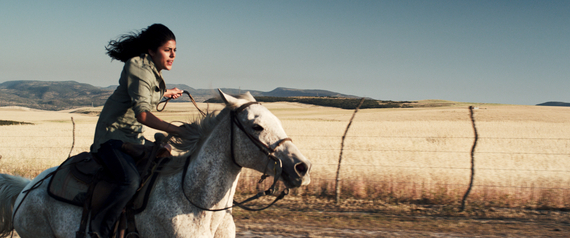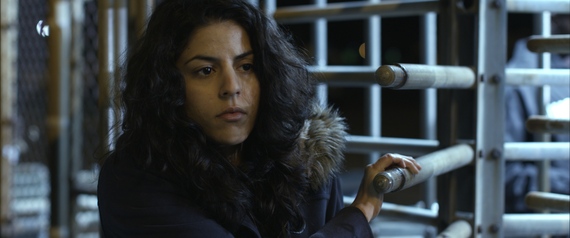It seems like we are in a wave of stories trying to make sense of the financial crisis and the surrounding moral vacuum. The Wolf of Wall Street, The Big Short, and Billions all tell versions of the story, just to name a few. But these stories stick to similar settings, with similar characters, and ask the same kinds of questions - like how were those guys seduced by all the wealth and lure of power, and what did it look like? To me, these stories are too close to the financial centers, the suits, and the resort-style prisons to show the real stakes and the real consequences of our dark American Dreaming. Isn't the whole problem that there are no consequences and these guys get away with it?
In Hostile Border, we follow a young undocumented woman, Claudia, playing by the same rules and chasing a similar American Dream as the guys on top. But she's operating in a very different context. Despite her determination not be a victim and no matter how much she maneuvers and deceives, the American Dream was not designed for her to win. And like for most of us, bending the rules is met with more than a slap on the wrist. Homes are lost. Families are broken. People get hurt.
Coming of age amidst the financial crisis, I entered an America where morals were for losers, 'the golden rule' was the beginning of a joke, white picket fences seemed synonymous with a death sentence, and if you wanted to win at the American Dream then you had to get your hands dirty. There was no space, privilege, or resources for questioning this. The human costs of operating this way are meant to be overlooked. And with that, the choices we are able to make narrow. It's "get rich or die trying." At best, questions of morals and cultural values shrink to bad vs. worse. For Claudia in Hostile Border, she becomes caught between self-preservation and violence. As she navigates this tightrope, the moral implications of her impossible choices take on weight. And ultimately, the tightrope cannot support her. The human costs cannot be ignored.
Growing up around the U.S.-Mexico border shaped my perspective on American cultural values. The border is not just two-sided. The border creates it's own cultures (and subcultures) on both sides that push and pull against whatever might qualify as American or Mexican. And that creates a space that challenges what is really important about who you are. It creates a space to take a hard look at the American Dream.
I became a filmmaker, inspired by stories that capture a feeling you can't put into words and ask questions we don't yet have answers to. In the final frames, we follow Claudia walking off into the distance. In this reimagining of the hero riding into the sunset, the questions are: what is the cost of our American dreaming? What kind of choices does our dreaming leave us caught with? And who might we be without it?

